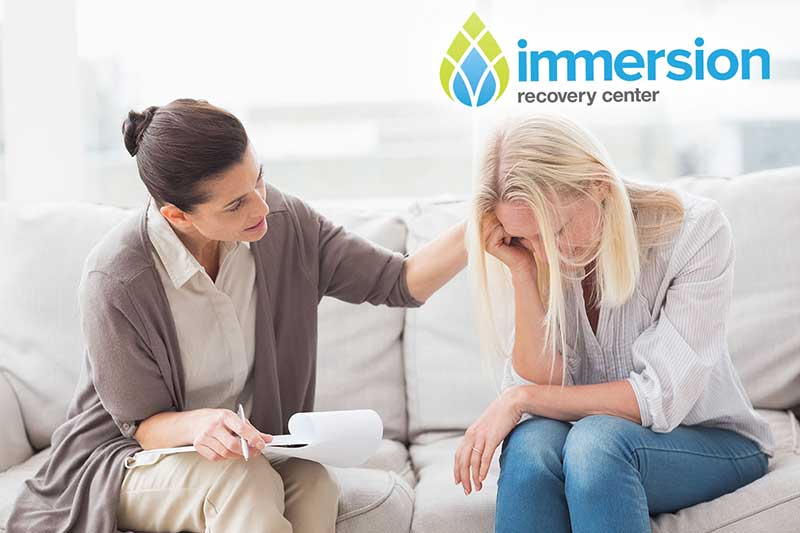Focused Treatment
Medically Assisted Opioid Detoxification
Medically Assisted Opioid Detoxification
At Immersion Recovery we understand how difficult opioid withdrawal can be. Many times withdrawal symptoms are so serve that those struggling with opiate addiction return to using within 24 hours. The key to overcoming this obstacle is a medically supervised detox where withdrawal symptoms can be identified and treated immediately. At The Immersion Program we perform an in-depth initial evaluation and tailor a treatment plan unique to each clients needs and recovery goals. The Immersion Program provides 24 hour medical supervision and comfort care for our detox clients. Our medical and client support team’s goal is to make sure all clients have a safe and comfortable detox so they can begin the next phase in their recovery journey.
The Effects of Opiates Addiction
Opioids are very commonly used as a method of self-medication, based largely on their sedative effects. For example, someone with an undiagnosed and untreated anxiety disorder might try a painkiller like Oxycontin at party, or be prescribed a temporary dosage after a minor surgery or sports-related injury. Temporary effects like increased relaxation, sedation, and drowsiness might contribute to an alleviation of symptoms associated with anxiety. Because the individual doesn’t realize that he or she suffers from an underlying mental health condition, he or she may seek out the Oxycontin again to feel “normal”. Unfortunately, painkillers such as this are highly addictive, and any repeated use, or using a medication other than as prescribed, can lead to physical and mental dependency. People become addicted in a number of different ways – the important thing is being able to identify an addiction, and seeking professional help as soon as possible.
We Are Here For You
Let Us Help You Heal
Our detoxification experience is second to none.
Learn how we can help by speaking with one of our Treatment Advisors today.
Signs of Opiates Addiction
- Increased tolerance (needing more of the drug to experience the same effects).
- An inability to reduce or stop use (attempted to quit, unable to do so).
- A desire to keep using in spite of consequences (these consequences could relate to health, the distancing of family and friends, financial consequences, or getting into trouble with the law).
- Spending an excessive amount of money and time on drugs (justifying the amount spent on obtaining drugs, but the truth is – the balance in their bank account is rapidly dwindling).
- Changes in appetite and sleep patterns (either sleeping more than before or suffer from insomnia, and have been losing weight as a result of a harshly decreased appetite).
- Changes in mood (experiencing quick and inexplicable shifts in mood – one moment happy and content, and the next, irritable and yelling).
- A major impact of interpersonal relationships (friends and family members have expressed concern, and as a result, they get pushed away).
- An overall decline in quality of life (generally, addicts aren’t as happy as they used to be – things seem more difficult and more frustrating than they ever were before).
- More involvement in illegal activities (addicts do whatever they need to do to obtain more drugs – even if this means stealing, lying, and manipulating loved ones).
Our Opioid Detox Services Include
The effects of opiate abuse and addiction can be truly devastating. Fortunately, with long-term treatment, all of the damage that was accrued during active addiction can be successfully reversed. Of course, healing from such extensive damage takes time, which is why entering opiate detox at an accredited medical facility as soon as possible is unquestionably the best option.
Opiates Withdrawal
Opioid withdrawal will generally begin 12 to 24-hours after the last use. Because the mental and physical symptoms of withdrawal are so harshly uncomfortable, opioid addicts that do not enter a medically monitored detox will generally return to using within the first day the symptoms appear.

Symptoms of Opiates Withdrawal
- Nausea and vomiting
- Stomach cramping
- Muscle cramping
- Anxiety
- Overwhelming cravings
- Depression
- Excessive yawning
- Racing heart
- Fever and cold sweats
- Insomnia or fatigue
Ready To Begin Your Opioid Detox?
We Offer A Safe & Effective Program
Don’t let Opioid addiction control your life.
Call us today and let’s get you started on the path to a better you.
(888) 693-1604
The majority of these physical symptoms can be treated with a non-narcotic painkiller, like a high dosage of ibuprofen. Depending on how severe the addiction was and how long it lasted, further medications may be required. These could include anticonvulsants, antidepressants, other prescriptions that are specific to certain withdrawal symptoms. The psychological symptoms of opioid detox usually require pharmaceutical intervention – namely when it comes to alleviating cravings. Cravings (and withdrawal symptoms as a whole) can be lessened and managed by replacing heroin or prescription painkillers with a long-acting opioid like buprenorphine. Partial agonist drugs like buprenorphine are used to manage symptoms by allowing opioids to stay within the system without providing the “high” that heroin and painkillers provide. They are a safe way to successfully detox and stabilize – when their use is being monitored by a medical professional.
Begin Healing Now!
Have A Call With One Of Our Treatment Advisors
Don’t Suffer Any Longer
Treatment for Opiate Withdrawal
At Immersion Recovery we utilize pharmaceutical intervention depending on the severity of withdrawal symptoms – we understand that active addiction is different for everyone, and that not all detoxification processes are the same. Upon clients arrival at our medical detox facility, we conduct an in-depth evaluation which will help us determine which treatment methods are right for each clients unique case. Medical detox is only the very first step in a comprehensive treatment plan – once our clients have been physically stabilized, we transfer them to an inpatient treatment center where their recovery journey continues.
















